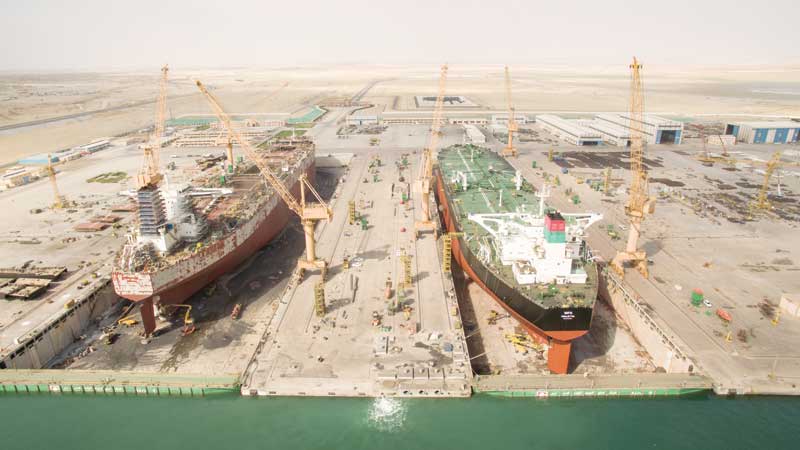

Muscat: The ASYAD group aims at achieving growth and business continuity while keeping the sustainability of marine life high on its agenda, by adopting international practices to reduce greenhouse gas emissions and limit the Sulphur content in fuel oil in its operations. These efforts are in line with the Sultanate of Oman Logistics Strategy (SOLS 2040) to cement the country as a global logistics hub.
ASYAD Group, true to its values, has been geared up to celebrate the World Maritime Day, which falls on September 24, with the theme “Sustainable Shipping for a Sustainable Planet.”
The logistics group is committed to preserving Oman’s marine ecosystem through its implementation of sound maritime transport practices.
ASYAD Group adheres to the International Convention for the Prevention of Pollution from Ships (MARPOL Annex VI), throughout its maritime operations as part of its efforts to protect the maritime environment. Green initiatives, such as using Very Low Sulphur Fuel Oil (VLSFO); prohibiting fuel or plastics discharge into the marine environment; and controlling ships ballast water and sediments are part of ASYAD Group’s standard protocol.
Throughout its operations, the group translates the sustainable development goals (SDGs) in the area of maritime transport into long-term initiatives. Oman Shipping Company has been adopting several measures to equip its fleet with innovative technologies. In addition to installing scrubbers on board the ships to clean the exhaust gas of ships, the company uses Very Low Sulphur Fuel Oil (VLSFO) 0, which reduces sulfur dioxide (SO2) emission by 80 per cent, as well as silicone-based anti-fouling coatings for its ship hulls. Oman Shipping Company is also working on complying with the Ballast Water Management Convention, which involves the continuous exchange of the ballast water on the way from one port to another by not less than 200 nautical miles from the nearest land.
All Omani ports pay attention to the sustainability of the environment by adhering to international regulations and standards. The Port of Salalah, fitted with reception facilities, which works in compliance with the international and local requirements for Zero Tolerance of Illegal Discharges from Ships, provides a host of compliant logistics services centred on the safety of marine life. As for the Port of Duqm, it was established according to the best international environmental and safety standards to maintain maritime life.
In an unprecedented initiative, Sohar Port demonstrated its commitment to sustainable shipping by introducing a system that rewards international ships and shippers keen on reducing air emissions, in accordance with the IMO standards. Sohar Port gives a 5 per cent rebate on port dues to shipping companies that have made additional investments in their ships and crew to improve their environmental performance, safety and quality standards. This year witnessed a 40 per cent increase in rebates granted and 239 ships against 148 ships in 2019 were rewarded. Sohar Port is the only port in the Middle East and among 20 international ports providing such incentives within the framework of the World Ports Climate Initiative (WPCI).
Adhering to the quality requirements of MARPOL, Oman Dry Dock Company boasts integrated plants for recycling and disposing of chemical waste, as well as filtering and purifying bilge water and oily effluents before being discharged into the sea. Up to the end of August 2020, the quantities of treated and discharged water increased by 29 per cent compared to that of 2019. Furthermore, Oman DryDock Company has sold 4,073 tonnes of the oil it recycled this year; adding another revenue stream to the Company and registering a 140 per cent increase in the volume of sold recycled oil compared to last year.
Sinyar-Ferries have been following the International Convention for the Prevention of Pollution from Ships (MARPOL Annex VI) Air Pollution requirements, by limiting the Sulphur content in fuel oil and using eco-friendly waterjet propulsion solutions and built-in exhaust cooling systems; reducing gas emissions by 77% compared to regular ferry engines.
International Maritime College Oman (IMCO) provides process engineering courses and curricula supplementing the maritime transport sector with research outputs and a qualified national workforce, ready to contribute to the advancement of marine engineering and deal with various safety, environmental and marine issues. Moreover, IMCO gives intensive courses to the future seafarers on international practices to minimise risks to the marine environment, in addition to the impact of safety and environmental issues on the industry.
ASYAD Group will continue to pursue its stance of harmonising between its drive for economic growth while implementing responsible business practices to reduce its impact on the environment by adhering to the international agenda, introducing eco-friendly technologies, and nurturing a green logistics sector. — ONA
Oman Observer is now on the WhatsApp channel. Click here



